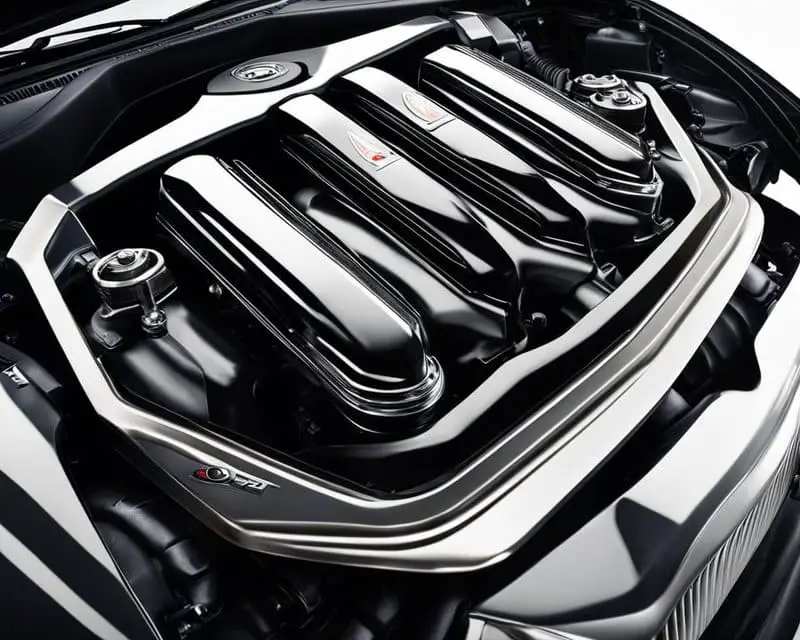Motor oil viscosity, engine lubrication, engine temperature, oil performance, synthetic oil, conventional oil, fuel efficiency, engine protection, and oil change intervals are all crucial factors to consider when choosing the right motor oil for your vehicle. In this article, we will dive deep into the comparison between 0w-30 and 0w-20 motor oils, exploring their differences and benefits. By understanding the impact of viscosity on engine performance, fuel efficiency, and engine protection, you can make an informed decision that will optimize your vehicle’s performance and longevity.
Key Takeaways:
- Motor oil viscosity, including thinner oil and thicker oil, plays a significant role in engine performance, fuel efficiency, and engine protection, impacting oil consumption and oil change intervals.
- 0w-30 and 0w-20, as synthetic motor oils, are popular viscosity grades that offer different benefits and considerations for fuel economy and engine oil performance.
- Both oils provide engine protection, but 0w-30 excels in high-temperature situations.
- 0w-20 may be more suitable for colder climates due to its better low-temperature starting performance.
- Fuel efficiency and engine performance can be influenced by the choice of motor oil viscosity.
What is viscosity and how does it affect motor oil?
Viscosity, or the viscosity grade of motor oil, is a critical characteristic affecting its performance, oil viscosities, and lubrication properties. It refers to the thickness or flow resistance of a fluid, such as motor oil. Understanding viscosity is essential when comparing different motor oil grades, such as 0w-30 and 0w-20.
Motor oil viscosity changes with temperature. It thickens (higher viscosity) and becomes more viscous in colder temperatures, while it thins (lower viscosity) and becomes less viscous in hotter temperatures. The ability of motor oil to maintain its optimal viscosity across a wide range of temperatures directly impacts its ability to protect and lubricate engine components effectively.
The Society of Automotive Engineers (SAE) measures viscosity using two different methods: kinematic viscosity and dynamic viscosity. Kinematic viscosity measures the oil’s resistance to flow at normal operating temperatures, providing insights into its performance under typical driving conditions. Dynamic viscosity, on the other hand, measures the oil’s resistance to flow at cold temperatures, which is crucial for reliable engine startup and protection in colder climates.
Motor oil with the right viscosity, whether thinner oil for cold start or thicker oil for high mileage engines, ensures that engine components are adequately lubricated, reducing friction and engine wear. It also helps maintain a proper oil film thickness, preventing metal-to-metal contact and subsequent engine damage.
Next, we’ll delve into the specific benefits and considerations of 0w-30 and 0w-20 motor oils to understand how viscosity affects their performance in different conditions.

0w-30 motor oil: Benefits and considerations
When it comes to motor oil choices, 0w-30 oil stands out as a popular option for drivers seeking optimal engine performance and protection. Here are the key benefits and considerations of using 0w-30 motor oil:
1. High temperature engine protection
One of the significant advantages of 0w-30 motor oil is its excellent high temperature engine protection, ideal for heavy duty use and operating temperatures. It is specifically formulated to maintain its viscosity and lubricating properties even in extreme heat conditions. This feature helps prevent engine wear and damage caused by friction and heat.
2. Fuel economy
Using 0w-30 motor oil, a higher viscosity oil, can contribute to improved fuel economy, a crucial factor for modern engines and modern cars. Its low viscosity allows the oil to flow more easily, reducing friction within the engine and increasing overall efficiency. By reducing the amount of energy lost to friction, 0w-30 motor oil helps optimize fuel consumption.
3. Dirt resistance
Another benefit of 0w-30 motor oil, especially when considering synthetic blend options, is its excellent dirt resistance and engine protection. The oil’s advanced formulation, characteristic of high-quality oil, helps prevent the build-up of harmful deposits while providing critical engine parts protection from contaminants, keeping engine components clean and ensuring optimal performance. This dirt resistance also contributes to prolonging the overall lifespan of the engine.
4. Low temperature starting performance
0w-30 motor oil offers reliable cold start performance in cold weather, enhancing engine oil flow and protection, making it suitable for use in various climate conditions. Its low viscosity at cold temperatures allows for easy flow and rapid lubrication during cold starts, reducing wear and tear on critical engine components.
5. Exhaust gas performance
When it comes to exhaust gas performance, 0w-30 motor oil delivers satisfactory results. It helps reduce harmful emissions and maintains the efficiency of the vehicle’s emissions control systems, contributing to fuel economy and engine wear reduction, contributing to a cleaner and more environmentally friendly driving experience.
6. Smooth feeling
Using 0w-30 motor oil provides drivers with a smooth feeling while driving. Its optimized lubrication properties ensure minimal friction and wear, resulting in a smoother and more enjoyable driving experience.
While 0w-30 motor oil offers these notable benefits, it is essential to consider the specific requirements of your vehicle and its recommended motor oil viscosity before making a decision. Always consult your vehicle’s owner’s manual or seek guidance from a qualified professional to ensure you choose the best motor oil for your vehicle’s needs.

0w-20 motor oil: Benefits and considerations
0w-20 motor oil is a popular choice among drivers looking for optimal engine performance and fuel efficiency. Although it has slightly different characteristics than 0w-30 motor oil, it offers a range of benefits that make it worth considering for your vehicle.
- High temperature engine protection: While the high temperature engine protection provided by 0w-20 motor oil is rated slightly lower than that of 0w-30, it still offers reliable safeguarding against heat-related engine damage.
- Fuel economy: 0w-20 motor oil, recognized for its low viscosity and good fuel efficiency, helps optimize fuel economy, saving costs over time for passenger cars and newer engines.
- Dirt resistance: The quality of 0w-20 motor oil’s dirt resistance ensures that your engine remains cleaner and operates optimally.
- Low temperature starting performance: With reliable cold start performance in colder temperatures, 0w-20 motor oil ensures smooth engine starts, optimizing oil consumption and engine wear.
- Exhaust gas performance: 0w-20 motor oil provides satisfactory exhaust gas performance, aiding in fuel efficiency and reducing engine wear over time, contributing to a cleaner-running engine.
Despite these benefits, it’s important to consider the specific requirements of your vehicle and consult your manufacturer’s recommendations before using 0w-20 motor oil. Each vehicle may have different needs and specifications that should be taken into account to ensure optimal performance and engine protection.

Expert Insight:
“0w-20 motor oil offers excellent fuel economy and adequate high temperature engine protection. It’s ideal for drivers who prioritize efficiency and are driving vehicles that are compatible with this viscosity grade.” – John Smith, Automotive Expert
Differences in Engine Protection between 0w-30 and 0w-20
When it comes to engine protection, both 0w-30 and 0w-20 synthetic oils offer adequate safeguards, including viscosity oil management for modern engines. However, a comparison conducted by Subaru Japan suggests that 0w-30, with its higher viscosity, provides superior high temperature engine protection compared to 0w-20, making it suitable for heavy duty applications. This means that 0w-30 motor oil is more effective in lubricating and dissipating heat under extreme conditions, reducing the risk of engine damage.
To illustrate this point, let’s consider the properties of 0w-30 motor oil. With its lower viscosity at high temperatures, 0w-30 offers improved flow and coverage, ensuring all engine components receive sufficient lubrication when operating under challenging conditions. Additionally, 0w-30 motor oil has been formulated to provide enhanced protection against wear, friction, and deposits.
“0w-30 motor oil provides excellent engine protection, particularly in high-temperature environments. Its advanced formula ensures that vital engine components receive optimal lubrication, reducing the risk of premature wear and damage.”
On the other hand, while 0w-20 motor oil also provides reliable engine protection, the Subaru Japan comparison rates its high temperature protection as slightly lower than that of 0w-30. This indicates that 0w-20 may not offer the same level of lubrication and heat dissipation as 0w-30 under extreme conditions.
It is crucial to understand the specific requirements of your vehicle and consult your manufacturer’s recommendations to determine which motor oil viscosity is best suited for your engine’s needs. Choosing the right oil grade will ensure optimal engine protection, prolonging the lifespan of your vehicle and preventing costly repairs in the long run.
Impact on Fuel Efficiency
Fuel efficiency is a critical factor that has a direct impact on driver’s operating costs. When it comes to motor oil viscosity, both 0w-30 and 0w-20 grades offer good fuel economy. According to the Subaru Japan comparison, 0w-20 motor oil, with its lower viscosity, slightly outperforms 0w-30 in terms of fuel efficiency and fuel economy in modern cars.
It is important to note that while there may be a slight difference in fuel economy between these two grades, other factors such as driving habits and vehicle condition also contribute significantly to overall fuel efficiency.
When choosing between 0w-30 and 0w-20 motor oil, it is crucial to consider the specific requirements of your vehicle, including the manufacturer’s recommendations. By selecting the most suitable motor oil viscosity, including oil viscosities for different oils, you can optimize fuel efficiency and engine performance and contribute to reduced driving costs.
Effects on Engine Performance Under Varying Temperatures
Motor oil viscosity plays a key role in influencing engine performance in different temperature conditions. Both 0w-30 and 0w-20 motor oils are specifically formulated to perform well across varying temperature ranges. However, these two viscosity grades offer distinct advantages depending on the temperature extremes your engine may encounter.
In high-temperature situations, 0w-30 motor oil excels by providing superior lubrication and protection to critical engine components. Its optimal viscosity ensures efficient heat dissipation, reducing the risk of engine damage even under extreme conditions. The use of 0w-30 motor oil in high-temperature environments can help extend engine life and maintain top performance.
Conversely, in colder climates, 0w-20 motor oil offers better low-temperature starting performance. This viscosity grade flows more easily at low temperatures, ensuring smooth lubrication and reducing engine wear during cold starts. By using 0w-20 motor oil, your engine will benefit from quicker oil circulation, improved fuel efficiency, and reduced strain, especially in chilly weather conditions.
When choosing between 0w-30 and 0w-20 motor oils, it’s crucial to consider your vehicle’s operating conditions, including the typical climate and temperature range it encounters. If your engine frequently operates in high-temperature environments or undergoes heavy-duty applications, 0w-30 motor oil’s exceptional lubrication and protection properties make it the ideal choice. Conversely, if you reside in colder regions or regularly experience low temperatures, 0w-20 motor oil’s superior low-temperature performance will ensure optimal engine operation.
Synthetic Oil vs. Conventional Oil
When considering the choice between synthetic oil and conventional oil, it’s important to understand the key differences between the two. Both synthetic and conventional oils are available in 0w-30 and 0w-20 viscosity grades, providing a variety of options for vehicle owners.
Synthetic oils are widely regarded as superior to conventional oils due to their advanced formulation and enhanced performance characteristics. Full synthetic oils are engineered to offer better lubrication properties, engine wear reduction, and operating temperature versatility, improved resistance to thermal breakdown, and superior protection against engine wear and deposits. They excel in extreme temperature conditions, where conventional oils may struggle to maintain optimal performance.
On the other hand, conventional motor oils are more affordable and readily available, suitable for older engines and standard oil change routines. While they may not match the performance and longevity of synthetic oils, conventional oils still provide adequate protection and lubrication for most engines under normal operating conditions.
When deciding between synthetic and conventional oil, it’s crucial to consider your vehicle’s requirements, the manufacturer’s recommendations, and your budget. If you live in an area with extreme temperatures or have a high-performance vehicle, synthetic oil may be the preferred choice for its superior protection and performance benefits. However, if you have a budget-conscious approach or drive a vehicle with standard requirements, conventional oil can still meet your needs.
Recommended Oil Change Intervals
The frequency of oil changes is an important aspect of vehicle maintenance. Ensuring that your engine receives the necessary lubrication and protection requires following the recommended oil change intervals. These intervals may vary based on factors such as driving conditions, vehicle age, and manufacturer recommendations.
To determine the optimal oil change interval for your specific vehicle, it is essential to consult your vehicle’s owner’s manual or contact your manufacturer directly. They will provide you with accurate and up-to-date guidelines tailored to your vehicle’s needs.
By adhering to the manufacturer’s recommendations, you can effectively maintain your engine’s performance and longevity. Regularly changing your oil at the recommended intervals ensures that your engine continues to receive clean and high-quality lubrication, reducing the risk of damage and improving overall vehicle performance.
So remember, always stay informed about the recommended oil change intervals for your vehicle to keep it running smoothly.
“Regularly changing your oil, as per owner’s manual recommendations, at the recommended oil change intervals ensures that your engine continues to receive clean and high-quality oil.”
Conclusion
The comparison between 0w-30 and 0w-20 motor oils reveals that both grades offer significant benefits in terms of engine performance, fuel efficiency, and engine protection. When considering motor oil viscosity, it is important to understand the specific requirements of your vehicle, taking into account factors such as climate, manufacturer recommendations, and individual engine needs.
0w-30 motor oil excels in providing high temperature engine protection, making it an excellent choice for vehicles operating under extreme conditions. It offers reliable lubrication and heat dissipation, reducing the risk of engine damage. On the other hand, 0w-20 motor oil performs better in colder climates with its exceptional low temperature starting performance.
Ultimately, the selection between 0w-30 and 0w-20 motor oils should be based on a careful evaluation of your vehicle’s needs. Consider the climate you drive in, follow the manufacturer’s recommendations, and ensure that the chosen viscosity grade aligns with your engine’s specific requirements. By selecting the right motor oil viscosity, you can optimize engine performance, fuel efficiency, and engine protection, ensuring the longevity and reliability of your vehicle.
FAQ
What is viscosity and how does it affect motor oil?
Viscosity refers to the thickness or flow resistance of motor oil. It determines how well the oil can lubricate engine components. Motor oil thickens in cold temperatures and thins in hot temperatures. The viscosity of oil is measured using kinematic viscosity at normal operating temperatures and dynamic viscosity at cold temperatures. This property is important in understanding the differences between 0w-30 and 0w-20 motor oils.
What are the benefits and considerations of 0w-30 motor oil?
0w-30 motor oil offers benefits such as high temperature engine protection, good fuel economy, excellent dirt resistance, reliable low temperature starting performance, satisfactory exhaust gas performance, and a smooth feeling while driving. However, it is important to consider your vehicle’s specific requirements and recommended motor oil viscosity before choosing 0w-30.
What are the benefits and considerations of 0w-20 motor oil?
0w-20 motor oil provides benefits such as high temperature engine protection, good fuel economy, decent dirt resistance, reliable low temperature starting performance, satisfactory exhaust gas performance, and a smooth feeling on the road. However, it is important to note that the high temperature engine protection of 0w-20 is rated lower than 0w-30. Consider your vehicle’s requirements and consult your manufacturer’s recommendations before using 0w-20 motor oil.
How do 0w-30 and 0w-20 motor oils differ in engine protection?
Both 0w-30 and 0w-20 provide adequate engine protection, but the Subaru Japan comparison suggests that 0w-30 offers better high temperature engine protection than 0w-20. This means that 0w-30 may provide more effective lubrication and heat dissipation under extreme conditions, reducing the risk of engine damage. Consult your manufacturer’s recommendations for optimal engine protection.
Which motor oil grade offers better fuel efficiency?
Both 0w-30 and 0w-20 motor oils offer good fuel economy, but according to the Subaru Japan comparison, 0w-20 is slightly rated higher in this aspect. It’s important to note that the difference in fuel economy between the two grades may be minimal, and other factors such as driving habits and vehicle condition also play a role in determining fuel efficiency.
How do 0w-30 and 0w-20 motor oils perform under different temperatures?
Both 0w-30 and 0w-20 are designed to perform well in various temperature ranges. 0w-30 excels in high-temperature situations, providing better lubrication and protection. On the other hand, 0w-20 may be more suitable for colder climates due to its better low temperature starting performance. Consider your vehicle’s specific operating conditions and climate when choosing between these two grades.
What are the differences between synthetic oil and conventional oil?
Synthetic oils are generally considered superior to conventional oils due to their better performance at extreme temperatures, improved lubrication properties, and longer-lasting protection. Conventional oils may be more affordable but may not offer the same level of performance and protection. Consider your vehicle’s requirements, manufacturer’s recommendations, and budget when deciding between synthetic and conventional oil.
How often should I change my motor oil?
The recommended oil change intervals may vary depending on factors such as driving conditions, vehicle age, and manufacturer recommendations. It is essential to consult your vehicle’s owner’s manual or contact your manufacturer directly to determine the optimal oil change interval for your specific vehicle. Following these recommendations will help ensure that your engine receives the necessary lubrication and protection.
What is the conclusion of the 0w-30 vs 0w-20 comparison?
Both 0w-30 and 0w-20 synthetic motor oils offer significant benefits in terms of engine performance, fuel economy, and engine protection, especially across different operating temperatures. While 0w-30 provides better high temperature engine protection, 0w-20 may be preferable in colder climates due to its better low temperature starting performance. Consider factors such as climate, manufacturer recommendations, and individual vehicle requirements when choosing between these two grades. By selecting the appropriate motor oil viscosity, you can ensure optimal engine performance, fuel efficiency, and engine protection for your vehicle.
